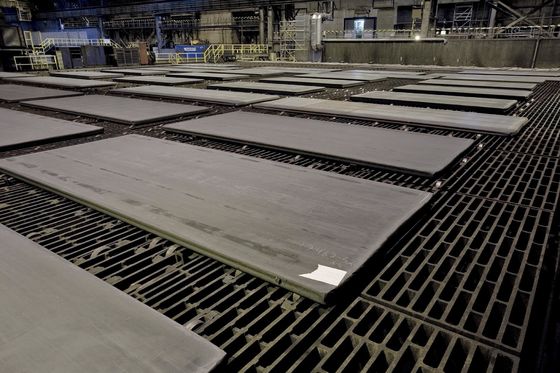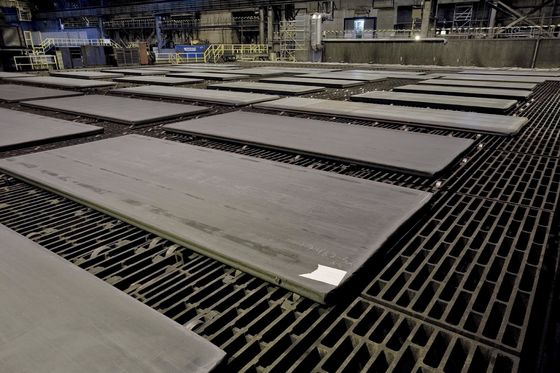1.Carbon Steel Plate
Carbon steel plate usually been considered as the steel that does not contain much alloy steel elements. Generally elements are C, Mn, P, S, Si, besides these there are no minimum limits for elements of Al, Cr, Ni, Mo, V etc.
Carbon steel plates are available in different grades depending on the carbon content and strength.
There are low, medium, and high carbon steel plates. The more carbon content, the more durable and stronger the plate becomes. There are further sub-categories depending on thickness and usage as well as the formation process. Usually carbon steel plates vary from 0.4 mm to 80 mm in thickness and 1000 mm to 25000 mm width, and they can be of length up to 12 meters. But the length is customizable which helps the customers to put them into various applications. One can also make cold rolled steel coils from them.
2.Alloy Steel plate----42CrMo4 alloy steel plate
Chemical composition % of steel 42CrMo4 (1.7225): EN 10083-3-2006
| C |
Si |
Mn |
P |
S |
Cr |
Mo |
| 0.38 - 0.45 |
max 0.4 |
0.6 - 0.9 |
max 0.025 |
max 0.035 |
0.9 - 1.2 |
0.15 - 0.3 |
Mechanical properties of steel 42CrMo4 (1.7225)
| Nominal diameter (mm): |
to 16 |
16 - 40 |
40 - 100 |
100 - 160 |
160 - 250 |
250 - 330 |
330 - 660 |
| Rm - Tensile strength (MPa) (+QT) |
1100-1300 |
1000-1200 |
900-1100 |
800-950 |
750-900 |
700 |
600 |
| Nominal thickness (mm): |
0.3 - 3 |
| Rm - Tensile strength (MPa) (+A) |
620 |
| Rm - Tensile strength (MPa) (+AC) |
630 |
| Nominal thickness (mm): |
to 8 |
8 - 20 |
20 - 50 |
50 - 80 |
| Rm - Tensile strength (MPa) (+QT) |
1100 |
1000 |
900 |
800 |
| Rm - Tensile strength (MPa) (+C) |
720 |
| Rm - Tensile strength (MPa) (+LC) |
670 |
| Nominal diameter(mm): or for flat products thickness: to 8; 8-20; 20-60; 60-100; 100-160; |
to 16 |
16 - 40 |
40 - 100 |
100 - 160 |
160 - 330 |
330 - 660 |
Re - Upper yield strength or
Rp0.2 - 0.2% proof strength (MPa) (+QT) |
900 |
750 |
650 |
500-550 |
460-500 |
390 |
| Nominal thickness(mm): |
0.3 - 3 |
| Rp0.2 0.2% proof strength (MPa) (+A) |
480 |
| KV - Impact energy (J) longitud., (+QT) |
+20°
30-35 |
| KV - Impact energy (J) transverse, (+QT) |
+20°
22 |
| Nominal thickness (mm): |
0.3 - 3 |
| A - Min. elongation Lo = 80 mm (%) (+A) |
15 |
| A - Min. elongation at fracture (%) transverse, (+QT) |
10-14 |
| A - Min. elongation at fracture (%) (+C) |
4 |
| A - Min. elongation at fracture (%) (+LC) |
6 |
| Nominal thickness (mm): |
to 16 |
16 - 40 |
40 - 100 |
100 - 160 |
160 - 250 |
| A - Min. elongation Lo = 5,65 √ So (%) (+QT), round products |
10 |
11 |
12 |
13 |
14 |
| Nominal diameter (mm): or for flat products thickness: to 8; 8-20; 20-60; 60-100; 100-160; |
to 16 |
16 - 40 |
40 - 100 |
100 - 160 |
160 - 250 |
| Z - Reduction in cross section on fracture (%) (+QT) |
40 |
45 |
50 |
50 |
55 |
| Z - Reduction in cross section on fracture (%) (+AC) |
57 |
| Brinell hardness (HBW): (+S) |
255 |
| Brinell hardness (HBW): (+A) |
241 |
| Vickers hardness ( HV): (+A) |
195 |
| Vickers hardness ( HV): (+QT) |
340 - 490 |
Properties of steel 42CrMo4 (1.7225)
Weldability: Bad weldability due to the high crack danger.
Hardenability: Medium-good hardenability, suitable for hot purposes till a temperature of 500 C. It can be hardened in oil. |

 YamThank you very much for your sincere service. The quality of your products has always been very good. We are very relieved and hope to have more cooperation in the future.
YamThank you very much for your sincere service. The quality of your products has always been very good. We are very relieved and hope to have more cooperation in the future. KhueThank you for your products. Your products are of good quality and considerate service. We are very confident and willing to cooperate with you. We hope there will be opportunities for cooperation with other products in the future.
KhueThank you for your products. Your products are of good quality and considerate service. We are very confident and willing to cooperate with you. We hope there will be opportunities for cooperation with other products in the future.
![]()





